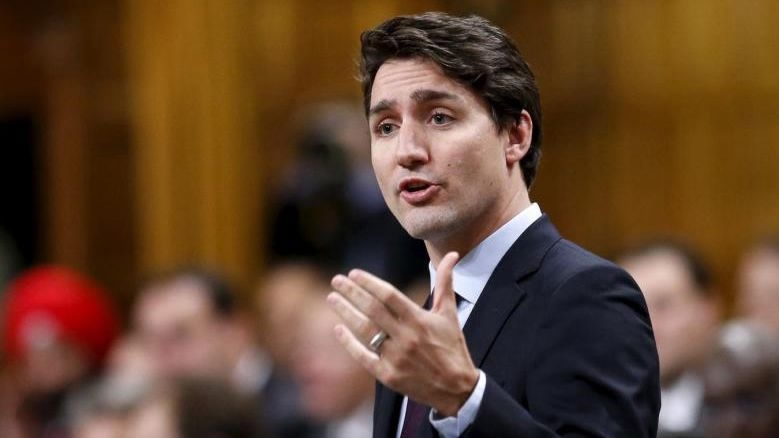
Opinions
17:53, 04-Dec-2017
Trade and Human Rights? – What to expect from Canada’s PM visit to China
Guest commentary by Dr. Fatima-Zohra Er-Rafia

Canadian Prime Minister Justin Trudeau will visit China this week (Dec. 3rd – 7th). He will first travel to Beijing to meet with Chinese President Xi Jinping and other Chinese officials. Then he will head to Guangzhou to deliver a keynote speech at a global business conference, where he will discuss trade and investment with several business leaders.
“I look forward to meeting again with China’s leaders to strengthen our relationship and set the stage for even greater trade and investment co-operation,” Trudeau said in a statement as reported by Canadian media.

Chinese Premier Li Keqiang (L) holds talks with his Canadian counterpart Justin Trudeau in Ottawa, Canada, Sept. 22, 2016. /Xinhua Photo
Chinese Premier Li Keqiang (L) holds talks with his Canadian counterpart Justin Trudeau in Ottawa, Canada, Sept. 22, 2016. /Xinhua Photo
Trade will be the primary topic on Trudeau’s agenda, with human rights being a marginal one.
Trade: An unavoidable topic at a time of global rising protectionism
Since 2003, China has been Canada’s second largest trading partner after the US. Leading commodities exchanged range from fish and wood products to chemicals to computer and peripheral equipment.
While imports from China rose 400% between 1998 and 2007, imports from Canada grew only by 272% as reported by The Fraser Institute. Current bilateral trade is estimated at 90 billion Canadian dollars annually and is expected to double by 2025 at the latest.
With the North American Free Trade Agreement (NAFTA) hitting an impasse in recent weeks due to the American hardline stance, Canada is contemplating the initiation of free trade talks with China. This comes after having had consultations with businesses, academics, and civil society groups. Canada, though, has yet to make an official decision, despite previous exploratory discussions.
“What Canadians expect from us is to engage with China responsibly and with our eyes wide open,” Canadian International Trade Minister François-Philippe Champagne told CBC Radio’s The House.

Premier Li addresses the 6th Canada-China Business Forum in Montreal, Canada, Sept. 23, 2016. /Xinhua Photo
Premier Li addresses the 6th Canada-China Business Forum in Montreal, Canada, Sept. 23, 2016. /Xinhua Photo
Canada is aware that the free trade talks will take time, having observed the Australian talks, which took over ten years before an agreement was finally reached.
With the US Commerce Department initiating an anti-dumping investigation into Chinese aluminum, and Trump’s criticism of China’s handling of the DPRK crisis, Canada has become an attractive alternative for a China that is looking for new markets. Already, Canadian inward foreign direct investment from China went from 192 millions Canadian dollars in 2000 to 21,393 millions Canadian dollars in 2016 according to Statistics Canada.
That said, with Canada becoming a member of the Asian Infrastructure and Investment Bank (AIIB) on March 23 of 2017, Canada recognizes the global power shift favoring China, the second-largest economy in the world. This move will benefit both Chinese and Canadian economies through expertise sharing and infrastructure investments.
China has many opportunities to offer Canadian businesses: Environmental protection and restoration, education and research, innovation, tourism, modernization of agriculture, food quality and safety. Opportunities that are in line with the cooperation pledge signed between the two countries in July 2017 during the visit of His Excellency David Johnston, the Canadian Governor General.
“The Canada-China relationship is a dynamic web of co-operative linkages that continues to grow year after year.”

Photo provided to CGTN
Photo provided to CGTN
The sensitive issue of human rights
A coalition of Canadian human rights groups, led by Amnesty International pressed Prime Minister Trudeau to talk about the case of sixteen political prisoners during this visit. Canadian officials argued that Prime Minister Trudeau always raises the human rights question when in the presence of Chinese officials.
However, realistically speaking, raising this sensitive issue in China while wanting to promote and strengthen the economic ties is foolhardy and risky, and the timing is inappropriate. "Patronizing" a country, while you are its guest, is a recipe for diplomatic disaster. It will only alienate China, and the aim of the visit will not be achieved.
Prime Minister Trudeau may talk about some "light" political cases to satisfy Canadians, but nothing major should be expected on that front.
It is noteworthy to say that all countries, Canada is no exception, seek to defend their economic interests on a global scale, the notorious example being Trump! Economic relations take precedence over political and human rights issues as illustrated by the French saying that “economy and feelings do not make good bedfellows.” Hence, states are increasingly leaving it to the UN to be the spokesperson for human rights.
(Dr. Fatima-Zohra Er-Rafia is a lecturer at HEC Montreal and Polytechnique Montréal, a consultant, and an independent researcher. The article reflects her opinions and not necessarily those of CGTN.)

SITEMAP
Copyright © 2018 CGTN. Beijing ICP prepared NO.16065310-3
Copyright © 2018 CGTN. Beijing ICP prepared NO.16065310-3